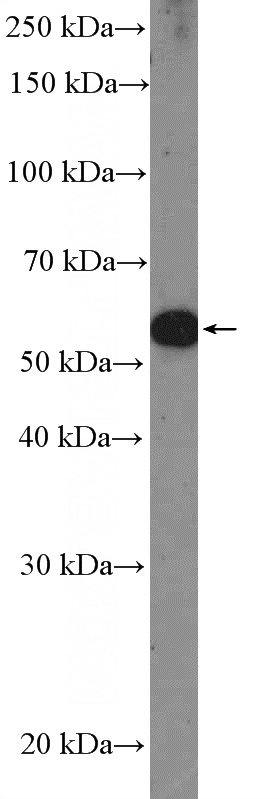-
Product Name
PAX3 antibody
- Documents
-
Description
PAX3 Rabbit Polyclonal antibody. Positive WB detected in mouse skin tissue, A375 cells, HepG2 cells, K-562 cells. Observed molecular weight by Western-blot: 56 kDa
-
Tested applications
ELISA, WB
-
Species reactivity
Human, Mouse; other species not tested.
-
Alternative names
CDHS antibody; HUP2 antibody; paired box 3 antibody; Paired box protein Pax 3 antibody; PAX3 antibody; WS1 antibody
-
Isotype
Rabbit IgG
-
Preparation
This antibody was obtained by immunization of PAX3 recombinant protein (Accession Number: NM_001127366). Purification method: Antigen affinity purified.
-
Clonality
Polyclonal
-
Formulation
PBS with 0.1% sodium azide and 50% glycerol pH 7.3.
-
Storage instructions
Store at -20℃. DO NOT ALIQUOT
-
Applications
Recommended Dilution:
WB: 1:200-1:1000
-
Validations

mouse skin tissue were subjected to SDS PAGE followed by western blot with Catalog No:113605(PAX3 Antibody) at dilution of 1:300
-
Background
PAX3, a transcription factor and multifunctional regulatory protein, is normally expressed during embryonic development. In the nervous system, PAX3 is involved in neural tube closure, neural crest development, and peripheral neuron differentiation. In the present study, PAX3 was reported as a novel regulator of GFAP transcription, and the overexpression and suppression of PAX3 could inhibit and promote NSC differentiation, respectively. In muscle development, PAX3 ensures the survival of myogenic progenitor cells with Pax3-expressing progenitors giving rise to both skeletal and smooth muscle cells. PAX3 also has a well-established role in the development of melanocytes during embryogenesis, and has recently been characterized as a molecular switch in the mature melanocyte. Mutations in PAX3 can cause Waardenburg syndrome.
Related Products / Services
Please note: All products are "FOR RESEARCH USE ONLY AND ARE NOT INTENDED FOR DIAGNOSTIC OR THERAPEUTIC USE"
